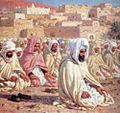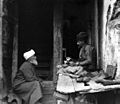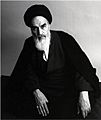Imam facts for kids
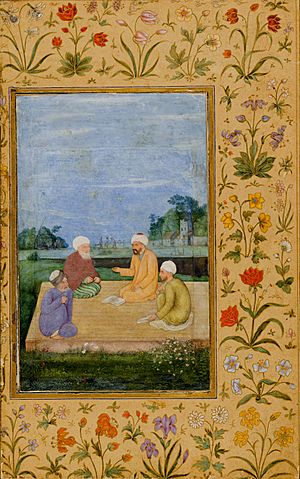
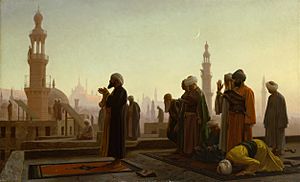
An Imam (Arabic: إمام) is an important leader in Islam. The word "Imam" means "leader" or "guide."
Most often, an Imam is the person who leads prayers in a mosque and guides the Muslim community. They help people understand their religion and offer advice.
For Shia Muslims, Imams are very special leaders of the Muslim community after the Prophet Muhammad. They are believed to be chosen by God and are considered perfect examples for everyone to follow.
Contents
Sunni Imams: Leaders of Prayer and Community
In Sunni Islam, an Imam is mainly the person who leads the daily prayers. This can happen in a mosque or anywhere a group of two or more Muslims pray together. The Imam leads the actions, and others follow.
The Imam also often gives the Friday sermon, which is a religious talk. Many mosques have an Imam who is officially appointed and paid. Sometimes, any knowledgeable person from the community can lead the prayers if needed. According to Islamic teachings, the best person to be an Imam is someone who knows a lot about the Quran (the holy book of Islam) and the Sunnah (the teachings and practices of Prophet Muhammad), and who has a good character.
The term "Imam" can also refer to a respected religious scholar or authority. For example, the founders of the main schools of Islamic law are called Imams.
Imams in Turkey
In Turkey, Imams are chosen by the government to work in mosques. They usually need to have a special high school or university degree in religious studies. This is an official job, and only men are appointed as Imams. Women in similar roles work as preachers or teachers of the Quran.
Shia Imams: Divinely Chosen Guides
For Shia Muslims, Imams are much more than just prayer leaders. They are seen as special people chosen by God to lead all of humanity. Shia Muslims believe these Imams are perfect and free from sin, a quality called ismah. Because they are chosen by God, their guidance must be followed.
The Twelve Imams of Shia Islam
Twelver Shia Muslims believe in a line of twelve Imams who were direct descendants of Prophet Muhammad. Here are the names and key facts about them:
| Number | Name | Birth–Death (CE) |
Importance | Birthplace | Place of death and burial |
|---|---|---|---|---|---|
| 1 | Ali ibn Abu Talib | 600–661 | The first Imam and successor to Prophet Muhammad for Shia Muslims. Sunni Muslims also respect him as the fourth Caliph. | Mecca, Saudi Arabia | Assassinated in Kufa, Iraq. Buried in Najaf, Iraq. |
| 2 | Hassan ibn Ali | 624–670 | Prophet Muhammad's eldest grandson. He briefly became a caliph before making a peace treaty. | Medina, Saudi Arabia | Poisoned in Medina, Saudi Arabia. Buried in Jannat al-Baqi. |
| 3 | Husayn ibn Ali | 626–680 | Another grandson of Prophet Muhammad. He was killed in the Battle of Karbala for opposing the ruler of his time. This event is very important for Shia identity. | Medina, Saudi Arabia | Killed and beheaded in Karbala, Iraq. Buried in Karbala, Iraq. |
| 4 | Ali ibn al-Hussein | 658–712 | Known for his prayers collected in a book called Sahifa al-Sajjadiyya. | Medina, Saudi Arabia | Poisoned in Medina, Saudi Arabia. Buried in Jannat al-Baqi. |
| 5 | Muhammad ibn Ali | 677–732 | A famous early Islamic scholar who taught many students. | Medina, Saudi Arabia | Poisoned in Medina, Saudi Arabia. Buried in Jannat al-Baqi. |
| 6 | Ja'far ibn Muhammad | 702–765 | He founded the main school of Shia law, called Ja'fari jurisprudence. He taught many important scholars. | Medina, Saudi Arabia | Poisoned in Medina, Saudi Arabia. Buried in Jannat al-Baqi. |
| 7 | Musa ibn Ja'far | 744–799 | He led the Shia community during a time of change and established a network for religious contributions. | Medina, Saudi Arabia | Imprisoned and poisoned in Baghdad, Iraq. Buried in Kazimayn, Baghdad. |
| 8 | Ali ibn Musa | 765–817 | He was made a crown-prince by a caliph and was known for his discussions with religious scholars. | Medina, Saudi Arabia | Poisoned in Mashhad, Iran. Buried in Mashhad, Iran. |
| 9 | Muhammad ibn Ali | 810–835 | Known for his kindness and strong faith even during difficult times. | Medina, Saudi Arabia | Poisoned in Baghdad, Iraq. Buried in Kazmain, Baghdad. |
| 10 | Ali ibn Muhammad | 827–868 | He strengthened the network of deputies who helped manage the Shia community. | Surayya, near Medina, Saudi Arabia | Poisoned in Samarra, Iraq. Buried in Al Askari Mosque in Samarra. |
| 11 | Hassan ibn Ali | 846–874 | He faced many restrictions from the government during his life. | Medina, Saudi Arabia | Poisoned in Samarra, Iraq. Buried in Al Askari Mosque in Samarra. |
| 12 | Muhammad ibn al-Hassan | 868–unknown | Shia Muslims believe he is the current Imam and the promised Mahdi. They believe he is in hiding and will return one day with Jesus to bring justice and peace to the world. | Samarra, Iraq | Believed to be in "Occultation" (hiding) since 872 CE. |
Fatimah, the daughter of Prophet Muhammad, is also considered perfect by Shia Muslims, but she is not an Imam. Shia Muslims believe that the 12th Imam, Mahdi, will reappear on the Day of Resurrection.
Imams as Political Leaders
Sometimes, Imams have held both religious and political power. This happened in places like Oman and Yemen. In these areas, Imams were not just spiritual guides but also rulers of the land.
For example, in Yemen, a line of Zaidi Shia Imams ruled for over a thousand years, starting in 897 CE. This type of government, where religious leaders also hold political power, continued until the mid-20th century.
In modern Iran, Ruhollah Khomeini is officially called Imam. Many places and institutions in Iran are named after him, like a city, an international airport, and a university.
Gallery
Imams
-
An Imam reads verses from the Quran in the Mughal Empire.
-
Discussion between Islamic Imams in the Mughal Empire.
-
Crimean Tatar imams teaching the Quran.
-
Imam Shamil, a leader from the Caucasus.
-
Imam Khomeini, leader of the Iranian revolution.
-
An Ottoman Imam in Constantinople.
-
A Bosniak military Imam in the Austro-Hungarian Army.
-
Tuanku Imam Bonjol from Southeast Asia.
Muftis
-
Grand Mufti Mirza Huseyn Qayibzade of Tbilisi.
-
Traveling muftis of the Ottoman Empire.
-
Grand Mufti Absattar Derbisali of Kazakhstan.
-
Tomb of a mufti in Indonesia.
Shaykh
-
Kurdish sheikhs from 1895.
See also
 In Spanish: Imán (religión) para niños
In Spanish: Imán (religión) para niños
 | Charles R. Drew |
 | Benjamin Banneker |
 | Jane C. Wright |
 | Roger Arliner Young |





